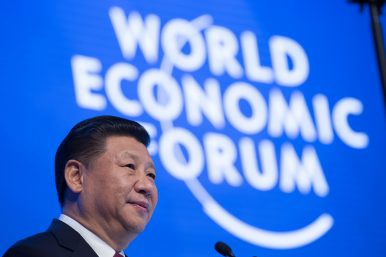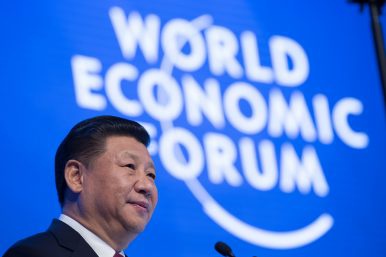From: Global Times and People’s Daily

A year after the leaders of the world's two biggest economies outlined vastly different ideas on the future of humanity, speakers at the World Economic Forum (WEF) have clearly chosen which vision they want to follow.
In contrast to US President Donald Trump's "America First" declaration, Chinese President Xi Jinping proposed building "a community of shared future for mankind" in January 2017 during a speech at the United Nations Office in Geneva, offering China's solutions to cope with global challenges. Since then, China has taken a leading role on economic globalization and the fight against climate change.
Even the theme of this year's WEF - Creating a Shared Future in a Fractured World - appears to have been inspired by Xi's thought.
At the forum in Davos, Switzerland, on Wednesday, a series of speakers echoed China's ethos on globalization, urging the world to shun protectionism and continue to bring down barriers to trade.
Canadian Prime Minister Justin Trudeau said his country will pursue new opportunities to sign free trade agreements with other countries as he urged the world to seek growth that works for everyone.
Indian Prime Minister Narendra Modi used his speech at the WEF to warn leaders of the threats facing globalization. "The forces of protectionism are raising their heads against globalization," he told attendees.
At the 2017 WEF, Xi also alerted leaders to the follies of isolationism. "Pursuing protectionism is like locking oneself in a dark room," he said.
The Chinese concept of building a human community with shared destiny was also incorporated into a resolution at the 55th session of UN Commission for Social Development.
Since then, the idea has been carried forward in the UN Security Council, the Human Rights Council and the first committee of the UN General Assembly, turning the concept into an international consensus.
More than 80 countries have signed agreements to cooperate with China on its Belt and Road initiative. Seventy-five economic cooperation zones have been established with 24 countries along the Silk Road Economic Belt, with Chinese enterprises investing over $50 billion overseas, creating nearly 200,000 jobs in foreign countries, the China Central Television reported.
"The Belt and Road initiative is the most vibrant and influential policy that promotes economic globalization in the world. The fact that the initiative has gained support from a majority of the countries in the world, other than the US, shows the trend of globalization is irreversible," Li Haidong, a professor at China Foreign Affairs University, told the Global Times on Wednesday.
"Countries benefit from the openness of economy, information, technology and personnel, not isolation. By implementing the idea of a community of shared future, many countries are fostering closer ties and strengthening globalization," Li said.
Superior proposal
China's idea of a shared destiny is important because it transcends the "zero-sum" thinking in the old model of international relations, said Wang Yiwei, the Jean Monnet chair professor at the Renmin University of China. It was formed with the mentality that dictates "my interests come first and they are more important than yours" in international politics.
"Donald Trump's 'America First' is in fact asking the world to serve US interests. Trump does not want a multilateral trade system because he wants to bully other countries into accepting his terms with US economic and military might," Chen Fengying, an expert at the China Institutes of Contemporary International Relations, told the Global Times.
"China's community of shared future for mankind is superior to 'America First' in worldwide recognition and moral high ground. The selfishness of the US policy has resulted in its withdrawal from the Paris Agreement on climate change and the Trans-Pacific Partnership. Even many European countries, including France and Germany, do not recognize Trump's vision," Chen noted.
In contrast to US President Donald Trump's "America First" declaration, Chinese President Xi Jinping proposed building "a community of shared future for mankind" in January 2017 during a speech at the United Nations Office in Geneva, offering China's solutions to cope with global challenges. Since then, China has taken a leading role on economic globalization and the fight against climate change.
Even the theme of this year's WEF - Creating a Shared Future in a Fractured World - appears to have been inspired by Xi's thought.
At the forum in Davos, Switzerland, on Wednesday, a series of speakers echoed China's ethos on globalization, urging the world to shun protectionism and continue to bring down barriers to trade.
Canadian Prime Minister Justin Trudeau said his country will pursue new opportunities to sign free trade agreements with other countries as he urged the world to seek growth that works for everyone.
Indian Prime Minister Narendra Modi used his speech at the WEF to warn leaders of the threats facing globalization. "The forces of protectionism are raising their heads against globalization," he told attendees.
At the 2017 WEF, Xi also alerted leaders to the follies of isolationism. "Pursuing protectionism is like locking oneself in a dark room," he said.
The Chinese concept of building a human community with shared destiny was also incorporated into a resolution at the 55th session of UN Commission for Social Development.
Since then, the idea has been carried forward in the UN Security Council, the Human Rights Council and the first committee of the UN General Assembly, turning the concept into an international consensus.
More than 80 countries have signed agreements to cooperate with China on its Belt and Road initiative. Seventy-five economic cooperation zones have been established with 24 countries along the Silk Road Economic Belt, with Chinese enterprises investing over $50 billion overseas, creating nearly 200,000 jobs in foreign countries, the China Central Television reported.
"The Belt and Road initiative is the most vibrant and influential policy that promotes economic globalization in the world. The fact that the initiative has gained support from a majority of the countries in the world, other than the US, shows the trend of globalization is irreversible," Li Haidong, a professor at China Foreign Affairs University, told the Global Times on Wednesday.
"Countries benefit from the openness of economy, information, technology and personnel, not isolation. By implementing the idea of a community of shared future, many countries are fostering closer ties and strengthening globalization," Li said.
Superior proposal
China's idea of a shared destiny is important because it transcends the "zero-sum" thinking in the old model of international relations, said Wang Yiwei, the Jean Monnet chair professor at the Renmin University of China. It was formed with the mentality that dictates "my interests come first and they are more important than yours" in international politics.
"Donald Trump's 'America First' is in fact asking the world to serve US interests. Trump does not want a multilateral trade system because he wants to bully other countries into accepting his terms with US economic and military might," Chen Fengying, an expert at the China Institutes of Contemporary International Relations, told the Global Times.
"China's community of shared future for mankind is superior to 'America First' in worldwide recognition and moral high ground. The selfishness of the US policy has resulted in its withdrawal from the Paris Agreement on climate change and the Trans-Pacific Partnership. Even many European countries, including France and Germany, do not recognize Trump's vision," Chen noted.
 Menu
Menu
 Davos speakers share Xi’s vision of 'community of shared future for mankind'
Davos speakers share Xi’s vision of 'community of shared future for mankind'
















